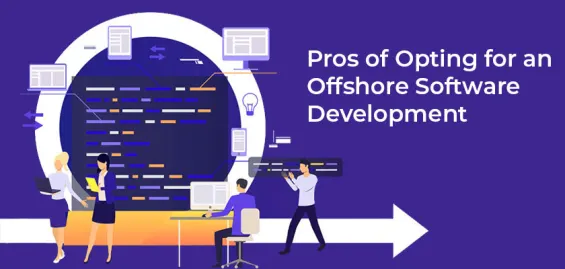This topic will be discussed with the following structure.
- What Is Offshore Software Development?
- Pros of Opting for an Offshore Software Development
- Things to Account for and Risks to Avoid
- How to Search for the Accurate Offshore Development Team?
- Wrapping Up
There is nothing more challenging than choosing a development team that can construct a software product for your startups, especially if you have no geographical limits or an option of considering Offshore Software Development.
Well, who doesn’t like multiple options in their platter? Offshore services serve the same purpose.
In the United States, the number of qualified IT staff is among the highest international figures - but it's impossible to say the same about Mexico.
Therefore, there would have been no better way for the Mexican corporation to look at a development team abroad than the US concerning the experience and capabilities of developers.
Product proprietors typically pick Offshore Software Development Company based in Eastern Europe, India or China.
The fundamental motivation to select this alternative and to seek Offshore developers in these remote countries is the price tag for their offshore software development services.
However, the qualifications of all developers in these countries are not low. Due to the undeniable cheap costs associated with such a process, many product owners opt for offshore software development.
In addition, factors like hidden costs and cultural issues are making Offshore Software Development organizations to consider a long-term when contemplating moving for the operations to an overseas nation.
The difficulty is that not everyone who plans to work with a remote development team is ready for it.
This leads to a lack of deadlines, the product is not launched on time, and the product owners have a negative experience of cooperation in this respect.
However, is this the exclusive fault of developers? Or if the owner of the product has to make every attempt to reach remote workers?
Let’s examine this topic in detail and understand how to optimize the connection between the team of offshore development and the owner of the product that helps you grow your startups without failing.
What Is Offshore Software Development?
Let's start from the outset. It is essentially a process in which the product owner distributes all or part of the development tasks to a third-party company to produce software solutions.
The primary reasons such an approach is used usually are the lack of professionals with the necessary qualifications or the lack of personnel needed to create software.
The process can be diverse, from user interface design to scratch application development.
Pros of Opting for an Offshore Software Development

Why are more companies choosing Offshore Software Development Services? Mind taking a glance at some of the primary pros that product owners enjoy?
1. Lower cost for development
One of the most popular/common benefits of working with offshore teams is the ability to reduce development costs without jeopardizing the quality of the end product.
As previously said, certain Eastern European developers are on par with American developers in terms of skills.
On the other hand, the living standards of these countries are significantly lower than in the US. As a result, IT companies situated there may afford to pay lower hourly rates (typically $35-50 per hour) without jeopardizing the product's quality.
Furthermore, you can obtain a variety of complimentary services (mainly consultancy services) that are often provided on a fee basis by other organizations.
2. Working with Top experts
Another frequent reason for working with offshore development businesses is to obtain top-tier expertise.
Unfortunately, due to slow advancement in a certain software development niche, it is fairly rare to be unable to find a skilled developer within the country.
Cooperating with international enterprises will, in turn, eliminate this problem and will almost certainly result in a bonus on the basis of lower hourly rates.
If this field is underdeveloped in your country, any developer who specializes in it will be peculiar search, commanding a high hourly cost.
3. Scalable Team

The necessity to expand the employees in order to boost the company's efficiency frequently works as the driving motivation for product owners in order to turn to third-party IT providers.
Obviously, the costs of generating additional jobs, tax payments, and office rents are not appealing, but there is a method to avoid them. In this case, working with a remote development team is the most cost-effective option.
4. No need for staff training
Last but not least, for most product owners, this is not the most evident benefit. You don't need to upgrade your developers' qualifications when you’re working with a team of offshore developers.
Training necessitates additional time and financial resources, which is sometimes not an option due to fierce competition and today's project launch terms. You can begin to work on a new product without needing to change the way your staff work if you hire offshore developers.
Things to Account for and Risks to Avoid
Working on the intricacies of offshore software development, there are issues of offshore collaboration that require unique attention. This can help you better prepare for an external team's remote format if you keep these factors in account.
1. Cost pitfalls:

Comprehensive budget preparation is crucial both for the onshore and offshore projects' ultimate success. But the first budget can be difficult to cover all the underlying expenditures. In case of unforeseen hikes in costs, you only need to have backup resources.
This is especially significant for the creation of custom offshore software.
2. Legislation:
Even the government is focused on boosting IT-related enterprises in certain countries with an ambitious IT industry and major technology hubs and communities.
It will become fairly helpful to you in the long term when you choose to employ an offshore staff, where it is easier for businesses to function and flourish.
3. Legal specifics:
From the foregoing, various government constraints and laws may be required before you continue on the creation of offshore software in a given country or region.
This is why you must be careful about the details of the contract. Ensure that key factors, such as local compliance, data protection and legislation, rights of intellectual property, terms of non-requisition, confidentiality and responsibility are clarified.
4. Keeping track of things:
The working method should be thoroughly documented with foreign staff. Even things that at the moment look to be non-essential should be tracked and recorded.
Yes, the milestones of the project should be prioritized, but the moments when we go from a project to another phase are equally important and demanding for the development cycle.
All this information can be used subsequently for company analysis and descriptions of product cases.
How to Search for the Accurate Offshore Development Team?
1. Define goals/objectives:

Before you even begin thinking about handing over any work to an offshore crew.
You should have a clear grasp of the end goals and demands of your business or project. Forget about the strategy of "we'll see how" and find out early on the following points:
- What is the main objective of the entire project?
- What do you need your company to achieve?
- What kind of product are you looking for?
- What do you expect in return from your investment or end product?
2. Study of places available:
Go to the most popular and available offshore locations and evaluate what is best appropriate for your specific objectives and demands. The ultimate choice might be depending on a number of concerns, and the characteristics of your region, culture and work.
Ideally, you should choose an offshore place where possible contractors can grasp and share a working outlook overall. In general, statistics can be studied locally with the following in mind:
- The total competence level of local specialists in the required sector or specialization;
- The similarity of cultural features in the location you live and work in;
- General English knowledge in the location you selected.
3. Absorb information:
The first thing you have to do is examine the projects of the selected development business very closely. If possible, contact their former clients/consumers and urge them to make a steady evaluation of the results of their team.
It is not unusual for development agencies to add projects to their Portfolio they have not worked on.
If you cannot talk to the former clients of your company, do not worry. Nowadays, websites for development companies and their clients provide unbiased evaluations. Check it out, too.
If you seem to have found the best software development firm ever, do not hurry immediately to sign the agreement.
At first, make sure the misleading developers do not rob your idea and data. It's straightforward — credible firms always conclude a non-disclosure agreement (NDA).
4. Define the Technology Stack:

Ask the officials of the company whether they can utilize the technology stack of your choice if you know your way in and out of development technologies and how their products must be constructed.
The fact is, certain organizations with low-level expertise employers provide you with choices.
If we employ earlier technologies, we can do everything much more manageable. Not all development companies attempt to retain customers and are driven by themselves. So don't rush to conclude if you're not technologically knowledgeable enough.
Wrapping Up
It would be a great way to introduce the Offshore Development business you choose for your organization’s policies, vision and objectives.
This makes it much convenient for the development company delegates to define priorities and comprehend how you see your future product.
Read Next
The following articles are related to offshore software development for startups: how not to fail.








